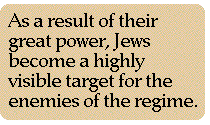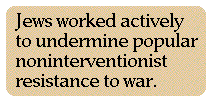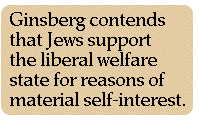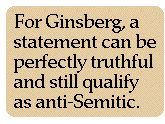Interested in reprint rights for this article?
www.thornwalker.com/ditch/deadlyenemy.htm
Full text from the October 1995 issue of The
Last Ditch
Deadly enemy, deadly friend
By Dr. STEPHEN J.
SNIEGOSKI
 Benjamin Ginsberg's The Fatal Embrace: Jews and the
State, which deals with the rise and fall of Jews in
different societies, is an intellectual bombshell. A liberal American Jew
who teaches political science at Johns Hopkins, Ginsberg
makes observations about Jewish influence in government
and society that would be deemed anti-Semitic if expressed
by a Gentile. Ginsberg, however, does not criticize that Jewish
power for being harmful to Gentiles; his only concern is the
harm it can cause for Jews by provoking Gentiles to
anti-Semitic actions.
Benjamin Ginsberg's The Fatal Embrace: Jews and the
State, which deals with the rise and fall of Jews in
different societies, is an intellectual bombshell. A liberal American Jew
who teaches political science at Johns Hopkins, Ginsberg
makes observations about Jewish influence in government
and society that would be deemed anti-Semitic if expressed
by a Gentile. Ginsberg, however, does not criticize that Jewish
power for being harmful to Gentiles; his only concern is the
harm it can cause for Jews by provoking Gentiles to
anti-Semitic actions.
Outlining Jewish power since the Middle Ages, Ginsberg
notes that Jews helped kings expand and centralize their
realms; in mediæval Spain, for example, Jews were
closely tied to the monarchies, largely, but not solely, in the
financial sphere. But they also took the lead in working for
the revolutionary destruction of societies hostile to Jews;
thus, Jews played key roles in European revolutions, liberal
and Communist alike.
In the liberal revolutions and in the development of liberal
states, Jews propagandized the public and financed liberal
groups. In France, Jews helped establish the Third Republic
in the 1870s; their influence loomed especially large in the
republic's anti-clerical campaigns. Jewish financial and
media power also provided the underpinning for the
Weimar Republic, whose depiction as the
Judenrepublik by anti-Semites was not far
from the mark. In late 19th-century Britain, the
Jewish-dominated press championed imperialism, which
benefited Jewish finance. And during the early stages of the
Soviet regime, Jews were numerous in leadership positions,
especially in the secret police and the propaganda agencies,
which they dominated. In contrast to Judeophiles who claim
that Jews observe a higher humanitarian ethos, Ginsberg
acknowledges that Jewish Communists played a ruthless role
in liquidating their opposition.
 Ginsberg warns that as a result of their great power, Jews
become a highly visible target for the enemies of the regime
and often suffer group destruction with the regime's demise.
Thus in the late 15th century, Ferdinand and Isabella
expelled the Jews from Spain, where they had occupied key
positions under previous monarchs. In Germany, Hitler
eliminated the Jews along with the Weimar Republic; what
enabled Nazism to succeed was a coalescence of lower- and
upper-class opposition to Jewish power. Where such a fusion
of divergent classes does not take place, as in the French
Third Republic, Jewish power survives despite a high degree
of anti-Semitism.
Ginsberg warns that as a result of their great power, Jews
become a highly visible target for the enemies of the regime
and often suffer group destruction with the regime's demise.
Thus in the late 15th century, Ferdinand and Isabella
expelled the Jews from Spain, where they had occupied key
positions under previous monarchs. In Germany, Hitler
eliminated the Jews along with the Weimar Republic; what
enabled Nazism to succeed was a coalescence of lower- and
upper-class opposition to Jewish power. Where such a fusion
of divergent classes does not take place, as in the French
Third Republic, Jewish power survives despite a high degree
of anti-Semitism.
The Jewish fall from power does not always require the
demise of a friendly regime. Sometimes a previously
hospitable regime will eliminate Jews when they are no
longer necessary for the maintenance of power, as was the
case in the Soviet Union when Stalin dispensed with Jews.
Ginsberg's fundamental theory is that the Jewish close
relationship with the state is a "fatal embrace": the
achievement of great power, and the concomitant high
visibility, invite group destruction as situations change.
***
Ginsberg devotes the greatest part of his book to the history
of Jewish power in America. German Jews gained significant
power in the United States after the Civil War, largely in the
realm of finance. Jews financed the U.S. regime's Civil War
debt, the debts of the reconstructed Southern states, and the
nascent industries. In essence, according to our author, Jews
were a part of the new business and industrial class of the
Gilded Age, and became "identified with the worst excesses
of the nineteenth-century industrial order." (p. 75) Jewish
prominence induced an anti-Semitic opposition from
Southern and Western agrarians (Populists), and from
old-stock New England patricians. Reacting to that
anti-Semitic criticism, the Gentile business class jettisoned
its ties with the Jews and aligned itself with the patricians.
Thus, the 1890s saw the emergence both of exclusive clubs
that barred Jews and of anti-Jewish quotas in the Ivy League
colleges. Having been thrust out of the business elite, Jews
sought to alter the American economic system, Ginsberg
writes. They identified with the Progressive reform
movement and — on the part of the newly immigrating
Eastern European Jews — with radical socialism. The
Jewish role in the Progressive movement crested in the
Wilson administration, with Louis Brandeis playing a major
role in the creation of the Federal Reserve System and the
Federal Trade Commission. However, the Jewish rise was
transitory, cut short by the anti-radical Red Scare in the
aftermath of World War I, which destroyed radical and
reform movements as well as (in Ginsberg's view) an
emerging welfare state.
It was with Franklin Roosevelt's New Deal that Jews gained
long-term power in the United States, power that continues
into the present. Jews served as Roosevelt's idea men and
staffed his New Deal agencies. They played a fundamental
part in fashioning the centralized American welfare state
— and Ginsberg asserts that they created it to serve
their own interests. In contrast to American Protestants'
success in the private sector, Ginsberg writes that Jews
"relied upon the state and the public economy to achieve
positions of influence and status in American society." (p.
103) That account contrasts, we should note, with Thomas
Sowell's portrayal of Jewish success via the free market.
Jews served as Roosevelt's idea men and
staffed his New Deal agencies. They played a fundamental
part in fashioning the centralized American welfare state
— and Ginsberg asserts that they created it to serve
their own interests. In contrast to American Protestants'
success in the private sector, Ginsberg writes that Jews
"relied upon the state and the public economy to achieve
positions of influence and status in American society." (p.
103) That account contrasts, we should note, with Thomas
Sowell's portrayal of Jewish success via the free market.
Jews also played a significant role in getting the United
States into World War II to destroy their Nazi nemesis. And
they worked actively to undermine popular
noninterventionist resistance to war. For example, the
Anti-Defamation League "employed investigative agents
who secretly penetrated isolationist and anti-Semitic
organizations and collected potentially damaging or
incriminating information" which it turned over to the FBI
and other federal agencies. (p. 110) Ginsberg does not
develop this point, but given the fact that the overwhelming
majority of "isolationists" were not enemy agents and were
simply exercising their constitutional right to oppose a
policy, it is apparent that activist American Jews have been
quite willing to crush the civil liberties of others in order to
advance their own goals. Jews also played a critical part in
turning the media toward a prowar stance. (That was quite an
achievement, since the American mood in the 1930s was
strongly antiwar and "isolationist.") In Hollywood, Jewish film
makers concentrated on producing anti-Nazi propaganda
films to prepare the masses for a crusade against evil.
In the immediate postwar period, right-wing attacks on
Communist subversion put Jews on the defensive. Since Jews
had been numerous in the American Communist Party, to
them the attacks reeked of anti-Semitism. But by joining
forces with the also-imperiled WASP elite, Jews were able to
destroy the threat by exercising their media power. They did
not just succeed in downplaying the idea of Communist
subversion; they were even able to change the issue from
Communist subversion to the right-wing threat to American
civil liberties. That was quite a striking ideological
turnaround from the Jews' total disregard of the civil liberties
of pre-World War II "isolationists." The Jewish success
against the right-wing danger meant that by the late 1950s,
"conservative anti-Communists who sought to maintain a
modicum of respectability ... carefully avoided the least hint
of anti-Semitism." (p. 125) Ginsberg cites William F. Buckley
Jr. as an example.
In the 1960s, the Jews played key roles in the civil rights
revolution and the concomitant Great Society programs. For
Jews, Ginsberg points out, support for black civil rights was
not only a "moral commitment" but also an "important
political tactic" to weaken the white South and the ethnic
machine politicians in the North, and, as a consequence,
increase their own relative power within the Democratic
coalition. Moreover, the advancement of the concept of
"equality of opportunity" bolstered Jewish power throughout
society. (pp. 125-26) Jews opposed the Vietnam War because
it inhibited the expansion of those liberal Great Society
programs in which their power resided.
By the end of the Great Society reforms, Jews, in Ginsberg's
view, had become the major force in American politics and
government:  "From the 1970s onward, Jews led or were
influential in most, though not all, of the political reform,
feminist, consumer rights, gay rights, environmentalist and
other public interest groups and related foundations, study
groups, and think tanks that came to dominate the
Democratic party during the 1970s and continue to be the
leading forces within that party today." (p. 137) And Jews
wield considerable power in the institutions of the American
welfare state, holding as they do prominent positions in the
"public or quasi-public economy of government agencies,
helping professions, private foundations, think tanks, and
universities." (p. 140) Since Jewish power and wealth is either
directly or indirectly tied to the national government, rather
than to state and local governments or to the strictly private
sector, Jews have a vested interest in its maintenance and
expansion. In short, Ginsberg contends, Jews support the
liberal welfare state for reasons of material self-interest:
"Jewish liberalism is more an institutional than
an attitudinal phenomenon. It is associated
more with Jews' political linkages and involvements than
with their underlying attitudes." (p. 143)
"From the 1970s onward, Jews led or were
influential in most, though not all, of the political reform,
feminist, consumer rights, gay rights, environmentalist and
other public interest groups and related foundations, study
groups, and think tanks that came to dominate the
Democratic party during the 1970s and continue to be the
leading forces within that party today." (p. 137) And Jews
wield considerable power in the institutions of the American
welfare state, holding as they do prominent positions in the
"public or quasi-public economy of government agencies,
helping professions, private foundations, think tanks, and
universities." (p. 140) Since Jewish power and wealth is either
directly or indirectly tied to the national government, rather
than to state and local governments or to the strictly private
sector, Jews have a vested interest in its maintenance and
expansion. In short, Ginsberg contends, Jews support the
liberal welfare state for reasons of material self-interest:
"Jewish liberalism is more an institutional than
an attitudinal phenomenon. It is associated
more with Jews' political linkages and involvements than
with their underlying attitudes." (p. 143)
Ginsberg attributes the rise of black anti-Semitism over the
past couple decades to the desire of upwardly mobile blacks
to share in the positions of power held by Jews in the
welfare-state apparatus. Jews may oppose some black
activities, but they cannot become too critical of blacks
because it is the idea of helping disadvantaged blacks that
provides the "legitimation of the American welfare state."
Indeed, Ginsberg maintains, "Many Jews and Jewish
organizations believe that the fundamental interests of Jews
are so closely tied, both politically and institutionally, to
those of blacks, that it is sometimes necessary to support
black demands even when, conceived narrowly or in the
short term, these seem to be disadvantageous to Jews." (p.
165) It is that vested interest in the liberal welfare state that
prevented most Jews from turning to Republicanism in the
1980s despite the Republicans' support for pro-Jewish
positions on racial quotas and the defense of Israel.
Although the overwhelming majority of Jews did not turn to
Reagan Republicanism in the 1980s, "Jews played important
roles in implementing the administration's economic and
foreign policy objectives," Ginsberg writes. "The association
of Jews with Reaganism, especially in the realm of foreign
policy, helped to heighten the anti-Semitism of forces on the
political Left but produced a measure of philo-Semitism on
the right, most notably among Protestant fundamentalists."
(p. 188) Neoconservative Reaganauts identified Israel as
America's "strategic asset" in the Cold War, and Israel
actually helped the United States fight communism in Latin
America and elsewhere. In the economic realm, Jewish
parvenu financiers such as Michael Milken were the major
beneficiaries of the Reagan rollback of regulations.
Ginsberg claims that the Republicans, unable to attract any
significant number of Jews to their side, abandoned their
support of the neocon elite with the end of the Cold War.
Israel simply was no longer needed as an ally. Thus
President Bush and Secretary of State James Baker tried to
coerce Israel into following American Middle East policy and
in so doing alienated their neoconservative support.
Ginsberg, who completed Fatal Embrace at
the beginning of the Clinton administration, emphasizes the
large number of Jews who were entering that regime,
reinforcing his theme of American Jewry's continued
identification with liberal Democrats.
The author attempts to gauge whether Jewish power —
which aroused strong opposition in the past — is
threatened today. Despite the explicit anti-Semitism of
blacks, Ginsberg doubts that they pose a direct threat to Jews
because of their dependence on the welfare state that Jews
supervise: blacks and Jews are "locked into a long-term
relationship which neither can easily abandon." (p. 183)
Black anti-Semitic rhetoric, however, has loosened the taboo
against anti-Semitism in American society, according to
Ginsberg, so that white right-wing forces — Joe Sobran,
Patrick Buchanan, David Duke, paleoconservatives —
can attack Jews and their agenda. Ginsberg believes that
those right-wingers, if they should use the correct populist
appeal to unite upper- and lower-class whites in what he
characterizes as the Nazi manner, could pose a formidable
threat to American Jewry: "An alliance of radical populists
and respectable conservatives would almost inevitably make
vigorous use of anti-Semitic themes to attack the liberal
Democratic regime, and the Jews would find themselves
locked in the fatal embrace of yet another state." (p. 243)
***
Ginsberg is far more explicit on the reality of Jewish power
than any other pro-Jewish author of which this reader is
aware. However, he leaves some important matters
unresolved.
First, it must be asked: What enables Jews to dominate
societies? Ginsberg says they have certain talents —
scholarly, business,  managerial — not possessed by the
bulk of the population. However, he does not claim (like
Nathaniel Weyl) that Jews are innately more intelligent than
other people. It is odd that societies supposedly based on
equality (such as America's current welfare state) would
come to reflect greater Jewish dominance. With all the
purported equal educational opportunities and aid to the
disadvantaged, one would think that social and economic
differences among groups would lessen over time. Of course,
it could be argued that the real purpose of the liberal welfare
state is not to help the disadvantaged but rather to keep
them dependent in order to maintain the rationale for the
welfare institutions that Jews dominate. Ginsberg does not
even hint at this explanation.
managerial — not possessed by the
bulk of the population. However, he does not claim (like
Nathaniel Weyl) that Jews are innately more intelligent than
other people. It is odd that societies supposedly based on
equality (such as America's current welfare state) would
come to reflect greater Jewish dominance. With all the
purported equal educational opportunities and aid to the
disadvantaged, one would think that social and economic
differences among groups would lessen over time. Of course,
it could be argued that the real purpose of the liberal welfare
state is not to help the disadvantaged but rather to keep
them dependent in order to maintain the rationale for the
welfare institutions that Jews dominate. Ginsberg does not
even hint at this explanation.
Also problematic is the author's understanding of
anti-Semitism. Ginsberg characterizes as anti-Semitic those
Gentiles who are critical of Jewish power and its uses.
Therefore, anti-Semitism does not necessarily entail racial
hatred, threats of racial expulsion or racial extermination, or
even lies. A statement can be perfectly truthful and still
qualify as anti-Semitic! Despite this apparent meaning,
Ginsberg still gives anti-Semitism a negative connotation.
Presumably, it is wrong for Gentiles to oppose the Jewish
agenda. A reader of Ginsberg's book should understand
from the outset that the work is directed to Jews and
Judeophiles, and that the author's concern is the long-term
effect of Jewish power on Jews. He does not dwell on the
negative impacts that Jewish power has had on Gentiles,
even though he cites examples in which Gentiles have been
harmed — such as in the Soviet Union.
Finally, Ginsberg underplays the importance of
neoconservatism. (Paul Gottfried, the foremost
paleoconservative analyst of neoconservatism, has
underscored the significant power of neoconservatism in
such works as The Conservative Movement. ) Bush and Baker did anger
neocons, but neoconservatism still dominates the
Republican Party and the American conservative
establishment. Neoconservatism simply does not threaten
the welfare-state apparatus that provides Jews a base of
power. As paleoconservatives correctly point out,
neoconservatism simply acts to coopt the conservative thrust
of the electorate, rendering it harmless to those whose
interests are served by the welfare state. Besides being
innocuous to the domestic welfare state, a neocon
Republican regime might better serve Jewish foreign policy
interests than a liberal Democratic one. It could pursue a
Zionist-oriented globalistic foreign policy without the
inhibitions of the Democratic Left. And having neocons in
strategic positions in the Republican Party means that the
Jews have placed their eggs in more than one basket: no
matter who controls the government, Democrat or
Republican, Jewish power remains intact. Outside of the
Jewish orbit there remain only Patrick Buchanan and the
paleoconservatives, whom Ginsberg sees as imminent
threats to Jewish power and its agenda.
Despite some questionable interpretations, The Fatal
Embrace is of immense value for its candid discussion of
Jewish power, especially since it is authored by a Jew who
identifies closely with Jewish interests. It is must reading for
anyone interested in this taboo but critically important
subject.
Posted July 26, 2001
If you found this article to be interesting, please donate to our cause. You should make your check or m.o. payable in U.S. dollars to WTM
Enterprises and send it to:
WTM Enterprises
P.O. Box 224
Roanoke, IN 46783
Thanks for helping to assure a future for TLD!
Notice to visitors who came
straight to this document from off site: You are deep in The Last Ditch. You
should check out our home page and table
of contents.
*New York: Macmillan,
1992. [Back]
 Benjamin Ginsberg's The Fatal Embrace: Jews and the
State, which deals with the rise and fall of Jews in
different societies, is an intellectual bombshell. A liberal American Jew
who teaches political science at Johns Hopkins, Ginsberg
makes observations about Jewish influence in government
and society that would be deemed anti-Semitic if expressed
by a Gentile. Ginsberg, however, does not criticize that Jewish
power for being harmful to Gentiles; his only concern is the
harm it can cause for Jews by provoking Gentiles to
anti-Semitic actions.
Benjamin Ginsberg's The Fatal Embrace: Jews and the
State, which deals with the rise and fall of Jews in
different societies, is an intellectual bombshell. A liberal American Jew
who teaches political science at Johns Hopkins, Ginsberg
makes observations about Jewish influence in government
and society that would be deemed anti-Semitic if expressed
by a Gentile. Ginsberg, however, does not criticize that Jewish
power for being harmful to Gentiles; his only concern is the
harm it can cause for Jews by provoking Gentiles to
anti-Semitic actions. Ginsberg warns that as a result of their great power, Jews
become a highly visible target for the enemies of the regime
and often suffer group destruction with the regime's demise.
Thus in the late 15th century, Ferdinand and Isabella
expelled the Jews from Spain, where they had occupied key
positions under previous monarchs. In Germany, Hitler
eliminated the Jews along with the Weimar Republic; what
enabled Nazism to succeed was a coalescence of lower- and
upper-class opposition to Jewish power. Where such a fusion
of divergent classes does not take place, as in the French
Third Republic, Jewish power survives despite a high degree
of anti-Semitism.
Ginsberg warns that as a result of their great power, Jews
become a highly visible target for the enemies of the regime
and often suffer group destruction with the regime's demise.
Thus in the late 15th century, Ferdinand and Isabella
expelled the Jews from Spain, where they had occupied key
positions under previous monarchs. In Germany, Hitler
eliminated the Jews along with the Weimar Republic; what
enabled Nazism to succeed was a coalescence of lower- and
upper-class opposition to Jewish power. Where such a fusion
of divergent classes does not take place, as in the French
Third Republic, Jewish power survives despite a high degree
of anti-Semitism.  Jews served as Roosevelt's idea men and
staffed his New Deal agencies. They played a fundamental
part in fashioning the centralized American welfare state
— and Ginsberg asserts that they created it to serve
their own interests. In contrast to American Protestants'
success in the private sector, Ginsberg writes that Jews
"relied upon the state and the public economy to achieve
positions of influence and status in American society." (p.
103) That account contrasts, we should note, with Thomas
Sowell's portrayal of Jewish success via the free market.
Jews served as Roosevelt's idea men and
staffed his New Deal agencies. They played a fundamental
part in fashioning the centralized American welfare state
— and Ginsberg asserts that they created it to serve
their own interests. In contrast to American Protestants'
success in the private sector, Ginsberg writes that Jews
"relied upon the state and the public economy to achieve
positions of influence and status in American society." (p.
103) That account contrasts, we should note, with Thomas
Sowell's portrayal of Jewish success via the free market. "From the 1970s onward, Jews led or were
influential in most, though not all, of the political reform,
feminist, consumer rights, gay rights, environmentalist and
other public interest groups and related foundations, study
groups, and think tanks that came to dominate the
Democratic party during the 1970s and continue to be the
leading forces within that party today." (p. 137) And Jews
wield considerable power in the institutions of the American
welfare state, holding as they do prominent positions in the
"public or quasi-public economy of government agencies,
helping professions, private foundations, think tanks, and
universities." (p. 140) Since Jewish power and wealth is either
directly or indirectly tied to the national government, rather
than to state and local governments or to the strictly private
sector, Jews have a vested interest in its maintenance and
expansion. In short, Ginsberg contends, Jews support the
liberal welfare state for reasons of material self-interest:
"Jewish liberalism is more an institutional than
an attitudinal phenomenon. It is associated
more with Jews' political linkages and involvements than
with their underlying attitudes." (p. 143)
"From the 1970s onward, Jews led or were
influential in most, though not all, of the political reform,
feminist, consumer rights, gay rights, environmentalist and
other public interest groups and related foundations, study
groups, and think tanks that came to dominate the
Democratic party during the 1970s and continue to be the
leading forces within that party today." (p. 137) And Jews
wield considerable power in the institutions of the American
welfare state, holding as they do prominent positions in the
"public or quasi-public economy of government agencies,
helping professions, private foundations, think tanks, and
universities." (p. 140) Since Jewish power and wealth is either
directly or indirectly tied to the national government, rather
than to state and local governments or to the strictly private
sector, Jews have a vested interest in its maintenance and
expansion. In short, Ginsberg contends, Jews support the
liberal welfare state for reasons of material self-interest:
"Jewish liberalism is more an institutional than
an attitudinal phenomenon. It is associated
more with Jews' political linkages and involvements than
with their underlying attitudes." (p. 143)  managerial — not possessed by the
bulk of the population. However, he does not claim (like
Nathaniel Weyl) that Jews are innately more intelligent than
other people. It is odd that societies supposedly based on
equality (such as America's current welfare state) would
come to reflect greater Jewish dominance. With all the
purported equal educational opportunities and aid to the
disadvantaged, one would think that social and economic
differences among groups would lessen over time. Of course,
it could be argued that the real purpose of the liberal welfare
state is not to help the disadvantaged but rather to keep
them dependent in order to maintain the rationale for the
welfare institutions that Jews dominate. Ginsberg does not
even hint at this explanation.
managerial — not possessed by the
bulk of the population. However, he does not claim (like
Nathaniel Weyl) that Jews are innately more intelligent than
other people. It is odd that societies supposedly based on
equality (such as America's current welfare state) would
come to reflect greater Jewish dominance. With all the
purported equal educational opportunities and aid to the
disadvantaged, one would think that social and economic
differences among groups would lessen over time. Of course,
it could be argued that the real purpose of the liberal welfare
state is not to help the disadvantaged but rather to keep
them dependent in order to maintain the rationale for the
welfare institutions that Jews dominate. Ginsberg does not
even hint at this explanation.